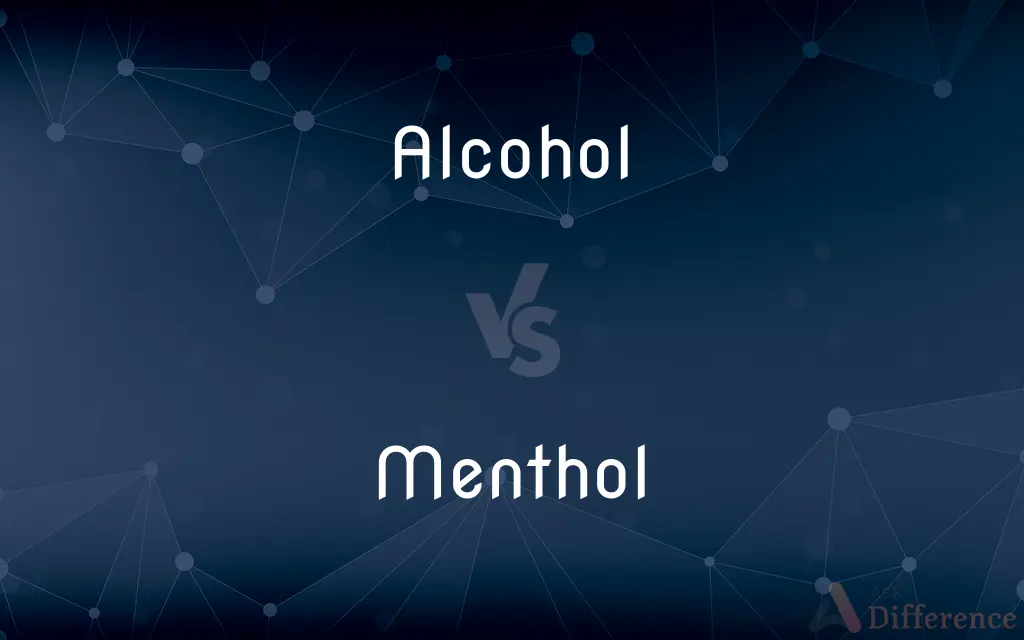Alcohol vs. Menthol — What's the Difference?
Edited by Tayyaba Rehman — By Fiza Rafique — Updated on November 2, 2023
Alcohol is a volatile, flammable liquid, often used in beverages or as a solvent. Menthol is a cooling compound from mint oils, used in flavorings and medicinals.

Difference Between Alcohol and Menthol
Table of Contents
ADVERTISEMENT
Key Differences
Alcohol refers to a category of organic compounds with a hydroxyl group (-OH) attached to a carbon atom. It is commonly associated with beverages like beer, wine, and spirits due to its psychoactive effects when consumed. Alcohol can also be used as an antiseptic or a solvent in various industrial applications.
Menthol, on the other hand, is a substance derived from mint plants. It has a characteristic cooling sensation and is often used in medicinal products such as cough drops, ointments, and nasal inhalers. Menthol does not have psychoactive properties and is not used as a beverage.
Alcohols, in general, are part of a broader chemical family and can vary greatly in their properties and uses. Some alcohols are safe for consumption, while others are used in industrial and scientific settings for their solvent or antiseptic qualities. The most well-known alcohol, ethanol, is the type found in alcoholic beverages.
Menthol is not a type of alcohol and does not belong to the alcohol chemical family. Its cooling properties are due to the activation of certain receptors in the skin and mucous membranes, and it is not flammable like many alcohols. Menthol is often found in topical analgesics and throat lozenges.
While both alcohol and menthol are organic compounds, their uses in everyday life differ significantly. Alcohol is often consumed in social settings and can lead to intoxication. Menthol is primarily used for its therapeutic effects, particularly for relieving symptoms like nasal congestion and minor throat irritation.
ADVERTISEMENT
Comparison Chart
Chemical Family
Hydroxyl compound
Terpene alcohol
Primary Use
Beverages, solvents, antiseptics
Flavorings, medicinals, cooling agent
Psychoactive Effect
Yes, in beverages
No
State at Room Temp.
Liquid (for most common alcohols)
Solid (pure menthol)
Sensation
Intoxication (when consumed)
Cooling (when applied topically)
Compare with Definitions
Alcohol
A colorless volatile flammable liquid that is the intoxicating constituent of wine, beer, spirits, and other drinks.
She decided to abstain from alcohol during January.
Menthol
A cooling agent used in various personal care products.
The shampoo contained menthol to invigorate the scalp.
Alcohol
A class of chemical compounds that includes methanol and ethanol.
Alcohol can be produced through the fermentation of sugars.
Menthol
A substance used in medicine to relieve minor throat irritation.
She used a menthol lozenge to soothe her sore throat.
Alcohol
A drink or beverage containing this substance.
They served a variety of alcohols at the party.
Menthol
A crystalline compound with a cooling minty taste and odor, found in peppermint and other natural oils.
Menthol is often added to toothpaste for its refreshing flavor.
Alcohol
Any organic compound whose molecule contains one or more hydroxyl groups attached to a carbon atom.
Alcohol is used as a solvent in the laboratory.
Menthol
An organic compound used in ointments for its cooling sensation.
Menthol is included in creams that relieve muscle aches.
Alcohol
A liquid substance used as a solvent or antiseptic in medical settings.
The nurse used alcohol to sterilize the patient's skin before the injection.
Menthol
Menthol is an organic compound made synthetically or obtained from the oils of corn mint, peppermint, or other mints. It is a waxy, crystalline substance, clear or white in color, which is solid at room temperature and melts slightly above.
Alcohol
In chemistry, alcohol is an organic compound that carries at least one hydroxyl functional group (−OH) bound to a saturated carbon atom. The term alcohol originally referred to the primary alcohol ethanol (ethyl alcohol), which is used as a drug and is the main alcohol present in alcoholic drinks.
Menthol
A crystalline alcohol with a minty taste and odour, found in peppermint and other natural oils. It is used as a flavouring and in decongestants and analgesics.
Alcohol
A colourless volatile flammable liquid which is produced by the natural fermentation of sugars and is the intoxicating constituent of wine, beer, spirits, and other drinks, and is also used as an industrial solvent and as fuel
The use of petrol containing alcohol
It is an offence to drive if you have more than 80 mg of alcohol per 100 ml of blood
Menthol
A fragrant white crystalline organic compound, C10H20O, obtained from peppermint oil or synthesized. It is used in perfumes, in cigarettes, as a mild topical anesthetic, and as a mint flavoring.
Alcohol
Any of a series of hydroxyl compounds, the simplest of which are derived from saturated hydrocarbons, have the general formula CnH2n+1OH, and include ethanol and methanol.
Menthol
(chemistry) a cyclic monoterpene alcohol; the major component of the essential oil of peppermint; used in pharmaceutical preparations as an antitussive and antipruritic agent, as a nasal decongestant, and in menthol cigarettes
Alcohol
A colorless volatile flammable liquid, C2H5OH, synthesized or obtained by fermentation of sugars and starches and widely used, either pure or denatured, as a solvent and in drugs, cleaning solutions, explosives, and intoxicating beverages. Also called ethanol, ethyl alcohol, grain alcohol.
Menthol
A menthol cigarette.
Alcohol
Intoxicating beverages containing ethanol considered as a group
The national consumption of alcohol.
Menthol
A white, crystalline, aromatic substance (C10H20O) resembling camphor, extracted from oil of peppermint (Mentha); - called also mint camphor or peppermint camphor. It has the peculiar effect on skin and membranes of making them feel cool, and is used in liqueurs, confections, cigarettes, cough drops and perfumes, among other things.
Alcohol
Any of a class of organic compounds (such as ethanol) containing a hydroxyl functional group (-OH).
Menthol
A lotion containing menthol which gives it a mint flavoring
Alcohol
(colloquial) Ethanol.
Menthol
A derivative of peppermint or other mint oils, used as a flavor or fragrance.
The lip balm had a hint of menthol for a cooling effect.
Alcohol
(uncountable) Beverages containing ethanol, collectively.
Alcohol
(obsolete) Any very fine powder.
Alcohol
An impalpable powder.
Alcohol
The fluid essence or pure spirit obtained by distillation.
Alcohol
Pure spirit of wine; pure or highly rectified spirit (called also ethyl alcohol or ethanol, CH3.CH2.OH); the spirituous or intoxicating element of fermented or distilled liquors, or more loosely a liquid containing it in considerable quantity. It is extracted by simple distillation from various vegetable juices and infusions of a saccharine nature, which have undergone vinous fermentation.
Alcohol
A class of compounds analogous to vinic alcohol in constitution. Chemically speaking, they are hydroxides of certain organic radicals; as, the radical ethyl forms common or ethyl alcohol (C2H5.OH); methyl forms methyl alcohol (CH3.OH) or wood spirit; amyl forms amyl alcohol (C5H11.OH) or fusel oil, etc.
Alcohol
A liquor or brew containing alcohol as the active agent;
Alcohol (or drink) ruined him
Alcohol
Any of a series of volatile hydroxyl compounds that are made from hydrocarbons by distillation
Common Curiosities
Can you drink menthol?
Menthol is not meant for consumption as a beverage and is used mainly for flavoring or medicinal purposes.
What exactly is alcohol?
Alcohol is a chemical compound characterized by a hydroxyl group, with ethanol being the type commonly found in beverages.
Are alcohol and menthol both derived from plants?
Some forms of alcohol, like ethanol, can be derived from plants, and menthol is derived from mint plants.
Is menthol related to alcohol?
Menthol is a terpene alcohol by structure, but not related to the types of alcohols used in beverages.
Do both alcohol and menthol have antiseptic properties?
Alcohol is used as an antiseptic, whereas menthol has mild antibacterial properties but is not commonly used as an antiseptic.
Does menthol produce a cooling effect when ingested?
Menthol produces a cooling sensation in the mouth and throat, which is why it's used in cough drops and throat lozenges.
Is the alcohol in hand sanitizers the same as in drinks?
The alcohol in hand sanitizers is typically ethanol or isopropanol, which is the same type of alcohol found in beverages, but often at a higher concentration and with additives not suitable for consumption.
What are the uses of menthol in personal care products?
Menthol is used in personal care products for its cooling effect and refreshing scent.
Is menthol only found in mint?
Menthol is most commonly derived from mint, but it can also be synthesized in a lab.
Can alcohol be used topically like menthol?
Yes, alcohol can be applied to the skin as an antiseptic, but it does not have the cooling effect of menthol.
Can the consumption of alcohol have medicinal benefits?
In moderation, some forms of alcohol, like red wine, may have health benefits, but excessive consumption is harmful.
Is menthol addictive?
Menthol is not addictive, though it is often added to cigarettes, which can be addictive due to nicotine.
Can you get intoxicated by menthol?
No, menthol does not cause intoxication like alcohol does.
Are there different types of alcohol?
Yes, there are many types of alcohol, including methanol, ethanol, and isopropanol, each with different properties and uses.
Can both alcohol and menthol be used in food products?
Alcohol can be used in food products, mainly for flavoring, while menthol is used as a flavoring agent as well.
Share Your Discovery

Previous Comparison
Lebni vs. Labneh
Next Comparison
Aggregate vs. TotalAuthor Spotlight
Written by
Fiza RafiqueFiza Rafique is a skilled content writer at AskDifference.com, where she meticulously refines and enhances written pieces. Drawing from her vast editorial expertise, Fiza ensures clarity, accuracy, and precision in every article. Passionate about language, she continually seeks to elevate the quality of content for readers worldwide.
Edited by
Tayyaba RehmanTayyaba Rehman is a distinguished writer, currently serving as a primary contributor to askdifference.com. As a researcher in semantics and etymology, Tayyaba's passion for the complexity of languages and their distinctions has found a perfect home on the platform. Tayyaba delves into the intricacies of language, distinguishing between commonly confused words and phrases, thereby providing clarity for readers worldwide.
















































